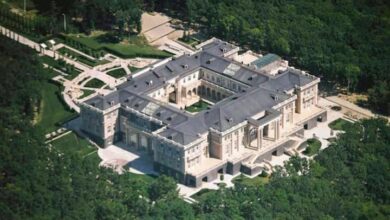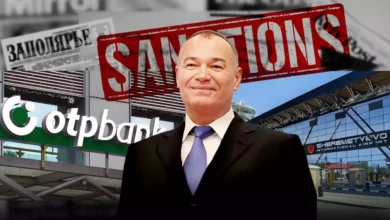Will Armenian Zangezur Combine be Restricted by 2024 US Sanctions ?
Officials from Armenia’s largest mine, the Zangezur Copper-Molybdenum Combine ( Zangezur Combine ) , claim recent U.S. sanctions targeting its Russian owner, Geopromining, don’t affect their operations. In a press release, they stated they are not subject to any international sanctions.
This comes after the U.S. blacklisted Geopromining and several of its subsidiaries, along with hundreds of other entities, as part of a wider sanctions package on the two-year anniversary of Russia’s invasion of Ukraine.
In a recent press statement, the State Department noted that Geopromining, which holds ownership of the Zangezur Combine through a complex network of subsidiaries, is linked to a group of Russian mining firms associated with Roman Trotsenko, a notable oligarch connected to President Vladimir Putin.
Notably, the specific subsidiaries responsible for the direct operation of the Zangezur Combine were not subjected to sanctions.
Zangezur Combine
Last year, the Zangezur Combine, a leading molybdenum producer, contributed nearly $175 million in taxes to Armenia, emerging as the largest single contributor to the nation’s state revenue. This amounted to over 3% of the government’s overall tax income. Situated in Armenia’s southern Syunik region, the enterprise provides employment to approximately 4,000 individuals.
In September 2021, Trotsenko acquired a majority of shares in the Zangezur Combine, thereby becoming its principal shareholder. Shortly thereafter, he transferred a significant portion of this stake to the Armenian government, a move that lacked any clarification or explanation. Despite inquiries, Armenian authorities have consistently declined to provide any commentary on this development.
In November last year, the Zangezur Combine announced that it had severed all connections with Trotsenko, attributing its largest shareholding to Svetlana Yershova, a Russian national known to have business affiliations with the oligarch. The enterprise’s ownership structure has been opaque for quite some time, posing challenges for journalists and the public to ascertain the true controllers and beneficiaries of the operation.
Shortly after the mine announced the termination of its ties with Trotsenko, the United States imposed sanctions on almost two dozen entities linked to the oligarch, including his holding company. However, Geopromining was not subjected to blacklisting until last week.
In addition to the Zangezur Combine, Geopromining oversees Sotk, Armenia’s largest gold mine, along with several other mining-related ventures in the country, all managed through subsidiary companies. Operations at Sotk, situated on the border between Armenia and Azerbaijan, have been mostly halted since last May due to frequent cross-border shelling.
Following Trotsenko’s transfer of shares in the Zangezur Combine to the Armenian government, the state has embarked on acquiring stakes in various other significant enterprises, such as the Amulsar gold mine, another crucial mining endeavor.
In January, Prime Minister Nikol Pashinyan’s administration officially sanctioned a proposal enabling the government to secure a minority interest in Amulsar, a project mired in environmental disputes and long-standing delays. However, the mine has yet to commence operations.
Armenia boasts substantial reserves of copper, gold, and molybdenum, with the mining sector serving as a major contributor to both employment and government income. A significant portion of Armenia’s mining operations are ultimately overseen by Russian entities.
US sanctions On Armenian entities
Since the outbreak of the conflict in Ukraine in February 2022, the United States has sanctioned only a few Armenian entities, despite singling out Armenia shortly after the conflict began as one of several “transshipment points” utilized by Russia to circumvent sanctions.
In May of last year, the United States imposed sanctions on Medisar, one of Armenia’s major importers of industrial and laboratory chemicals, for its reported business dealings in Russia. Several months earlier, the country sanctioned Milur Electronics, alleging its use as a front for a Russian microelectronics producer, and placed export controls on Taco, citing its supply of components to a Russian defense procurement firm.
Armenia experienced significant economic growth, expanding by 8.7% last year and 12.6% the year before, as reported by official figures. This growth was driven by substantial inflows of capital and labor from Russia, as well as a booming re-export business. Trade between Armenia and Russia reached a record high of $7 billion last year.








